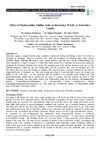 1 citations,
January 2006 in “Elsevier eBooks”
1 citations,
January 2006 in “Elsevier eBooks” Cats lose fur due to various reasons, including allergies, infections, genetics, hormones, diet, cancer, stress, and some conditions are treatable while others are not.
 September 2020 in “Journal of Investigative Medicine”
September 2020 in “Journal of Investigative Medicine” Omics techniques are needed to understand the scalp microbiome's role in alopecia areata for new treatments.
 53 citations,
January 2017 in “BioMed research international”
53 citations,
January 2017 in “BioMed research international” Genetically modified plants could be an important source of omega-3 fats to meet global needs.
 29 citations,
March 2019 in “British Journal of Dermatology”
29 citations,
March 2019 in “British Journal of Dermatology” Acne is significantly influenced by genetics, and understanding its genetic basis could lead to better, targeted treatments.
 1 citations,
April 2018 in “Revista da Sociedade Portuguesa de Dermatologia e Venereologia”
1 citations,
April 2018 in “Revista da Sociedade Portuguesa de Dermatologia e Venereologia” Hidradenitis suppurativa is a chronic skin condition more common in women, linked to genetics and lifestyle factors, and associated with various other health issues.

Women with PCOS are at higher risk for gum disease, and managing shared risk factors can help both conditions.
 July 2021 in “Journal of emerging technologies and innovative research”
July 2021 in “Journal of emerging technologies and innovative research” Ayurvedic methods successfully treated severe acne in a patient.
 June 2024 in “International Journal of Advanced Research in Science Communication and Technology”
June 2024 in “International Journal of Advanced Research in Science Communication and Technology” Herbal extracts like Ficus religiosa may help with hair growth and skin rejuvenation.

Changes in skin bacteria can affect hair loss and new treatments targeting these bacteria may prevent balding without sexual side effects.
 23 citations,
December 2021 in “Frontiers in Immunology”
23 citations,
December 2021 in “Frontiers in Immunology” IL-1 family cytokines are crucial for skin defense and healing, but their imbalance can cause skin diseases.
 January 2023 in “Journal of Ravishankar University”
January 2023 in “Journal of Ravishankar University” Hair loss can be caused by stress, aging, and harmful substances that create an imbalance in the body's natural processes.
 26 citations,
May 2019 in “PLOS ONE”
26 citations,
May 2019 in “PLOS ONE” Hair loss patients have different microbes in hair follicles, possibly affecting hair loss.
 59 citations,
November 2015 in “International Journal of Cosmetic Science”
59 citations,
November 2015 in “International Journal of Cosmetic Science” Oxidative stress damages hair and contributes to aging, and managing it can help maintain hair health.
 5 citations,
February 2013 in “Expert Review of Dermatology”
5 citations,
February 2013 in “Expert Review of Dermatology” New acne treatments include combination creams, advanced retinoids, and light therapies, focusing on safety and patient adherence.
 1 citations,
September 2023 in “Rheumatology advances in practice”
1 citations,
September 2023 in “Rheumatology advances in practice” A woman's rare scalp condition worsened after using a specific arthritis medication, suggesting such medications can sometimes trigger or aggravate psoriasis.
 July 2017 in “International journal of Ayurvedic and herbal medicine”
July 2017 in “International journal of Ayurvedic and herbal medicine” Madayantika Siddha Taila is effective for treating Seborrhea capitis.
 126 citations,
January 2009 in “International Journal of Trichology”
126 citations,
January 2009 in “International Journal of Trichology” Oxidative stress contributes to hair graying and loss as we age.
 119 citations,
January 2012 in “Nutrition & Metabolism”
119 citations,
January 2012 in “Nutrition & Metabolism” Modern lifestyles, including poor diet, stress, and long-term use of certain medications, hinder the body's ability to heal from inflammation, leading to chronic diseases.
 83 citations,
June 2018 in “Frontiers in immunology”
83 citations,
June 2018 in “Frontiers in immunology” Certain types of T cells are essential for healthy skin and play a role in skin diseases, but more research is needed to improve treatments.
 2 citations,
November 2023 in “Frontiers in microbiology”
2 citations,
November 2023 in “Frontiers in microbiology” The health of the gut may be important in developing new ways to prevent, diagnose, and treat alopecia areata.
 June 2023 in “Journal of Ayurvedic and herbal medicine”
June 2023 in “Journal of Ayurvedic and herbal medicine” Pumpkin seeds may improve health due to their rich nutrients and potential to treat various conditions.
48 citations,
April 2019 in “PloS one” Alopecia areata patients have more Propionibacterium acnes and less Staphylococcus epidermidis on their scalps.
 April 2024 in “Scientific reports (Nature Publishing Group)”
April 2024 in “Scientific reports (Nature Publishing Group)” Rosemary and neem extract may be an effective natural treatment for dandruff and hair loss.
 December 2024 in “Journal of Education Health and Sport”
December 2024 in “Journal of Education Health and Sport” Too much sugar harms skin, causing wrinkles and acne, but a low-sugar diet can help.
 50 citations,
February 2022 in “Nanomaterials”
50 citations,
February 2022 in “Nanomaterials” Nanomaterials show promise in improving wound healing but require more research on their potential toxicity.
 18 citations,
July 2022 in “Frontiers in Immunology”
18 citations,
July 2022 in “Frontiers in Immunology” Volatile organic compounds can cause inflammation and increase the risk of autoimmune diseases.
4 citations,
March 2022 in “BioEssays” Hydra can help understand human hair follicle microbiomes and develop new skin disease therapies.
1 citations,
February 2023 in “Pharmaceutics” New UVA-responsive nanocapsules effectively kill microorganisms in hair follicles when activated by light.

New treatments for hair loss should target eight main causes and use specific plant compounds and peptides for better results.
 4 citations,
November 2022 in “Frontiers in Immunology”
4 citations,
November 2022 in “Frontiers in Immunology” Lung and liver macrophages protect our tissues and their dysfunction can cause various diseases.



























